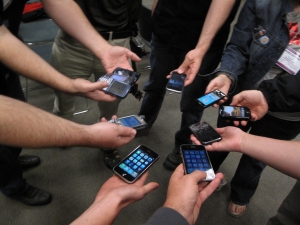What is the object you find most valuable in your life right now? Is it your family, or your friends? Is it your home or your car? Or is it a smaller object that keeps you connected to all of these things? Is it your cellphone?
One day I left my cellphone at home when heading out to work. When I arrived at work, I realized that I suddenly felt as if I was having a panic attack. My heart raced, and I began to perspire. I had left my cellphone and I felt disconnected. How would I get in touch with anyone and how would they get in touch with me if they needed me? I couldn’t remember anyone’s number because they are all programmed into my phone. I can tell you what my home number is from my childhood home but I can’t remember any of my closest family member’s cellphone numbers. Everyone in the house would not recognize the number and would probably let it go to the answering machine. The landline was a dead zone where only requests for changing our heating source came through these days. Has this ever happened to you?
The terminology for fear of being without your cellphone is called Nomophobia. Yes, due to the increasing addiction to cellphones it has officially become a phobia. Phobias are defined as an extreme or irrational fear or aversion to something according to Webster’s dictionary. If your cellphone usage has created this fear in your life you may also be experiencing an inability to complete daily tasks, work assignments or impact your ability to focus on important issues.
Are you addicted to the games on your phone? You are not alone! The small rewards received in the games give you a burst of the neurotransmitter dopamine which impacts your emotions and emits a feeling of pleasure. This feedback loop in the brain is the same that is experienced with recreational drug addiction.
In the study by Roberts, et al, (2014), The Invisible Addiction: Cell-Phone activities and addiction among male and female college students, it was found that the average college student is spending 9 hours every day on their phone. The authors noted that the cell phone can be an example of Mick and Fournier’s (1998) “paradox of technology” where the cell-phone is allowing for freedom to obtain information, talk with others, and be social, can also be restricting and lead to addictive behaviors. They focused on the fine line between being “a helpful tool to one that enslaves both users and society alike”.
Cellphone addiction was not included in the recent update of the Diagnostic and Statistical Manual of Mental Disorders, 5th Edition (DSM-5), but current research is showing similarities to a gambling addiction that was included in this version.
Cell-phone addiction signs and symptoms
- Using cellphones to escape interactions with others
- Increasing usage time
- Persistently failing to decrease usage times
- Using a cellphone when feeling anxious or depressed
- Losing sense of time while utilizing a cellphone
- Experiencing relationship or job difficulties due to preoccupation with cellphone
- Obsession with needing the newest version of a cellphone, needing more apps, and increasing time spent on a phone
- Withdrawal or separation anxiety is experienced when not able to use or reach a cellphone. Withdrawal symptoms include anger, tension, depression, irritability, or restlessness.
*Similar to Gambling Addiction (DSM-5, 2013)
Strategies for stopping the addiction
Modifying Behavior:
As with therapy for food, drug, or alcohol addiction, therapy for cell phone addiction focuses on the maladaptive behavioral patterns that an individual is using their cellphone for.
- Individuals learn how to identify and correct problem behaviors by considering positive and negative consequences with prolonged use of the drug or food. The same strategy would be helpful with extensive phone usage. Consider what you are missing in face-to-face interaction when you are staring at your phone.
Restricting usage:
Light from the cellphone impacts your sleep cycles. Bright light or blue light from cellphones which mimics daytime disrupts your circadian rhythm and impacts the production of the hormone melatonin, which alerts your body that it is time to sleep.
- Stop using your cellphone 1 hour before bed to reduce the activation of that daytime signal.
Focus on the present moment. Too often we are focused on past events, which trigger depression, or too focused on future events which are increasing our anxiety. We can not go back and change the past, we can learn from it so we do not repeat it. We also can not go into the future and know what to expect. Both entities consume most of our time and neither can we impact directly other than to learn from the past and plan for the future. The only difference we can make is in this present moment.
- Ask yourself what you are avoiding
- Sit for 10 minutes quietly and relax. Observe where your thoughts go without judging them.
- Think about what you could be doing to impact the present moment.
Shut off your phone
- What does that feel like? Is your heart racing?
- Get outside and go for a walk. Mindfully focus on the steps you are taking, the air you are breathing, the noises around you, and the sights you are taking in.
- See how long you can be without your phone and interacting with others. We are social beings and the increased use of cellphones is impacting how we relate and learn from others.
Challenge yourself to put the phone down a few minutes a day and build up to a longer period of time. Your health, significant others, work, school, and other interests will all prosper from it!
If you or anyone you know is having signs or symptoms of cellphone addiction, please contact Specialized Therapy Associates, (201)488-6678.
Jill Caruso, Psy.D.
Staff Psychologist Specialized Therapy Associates


